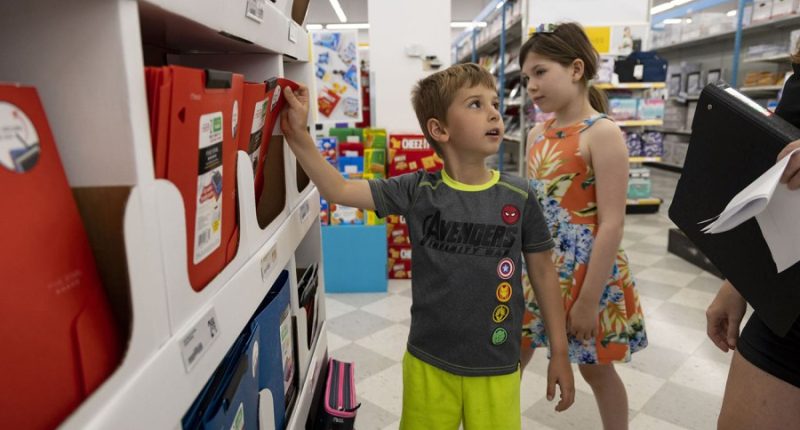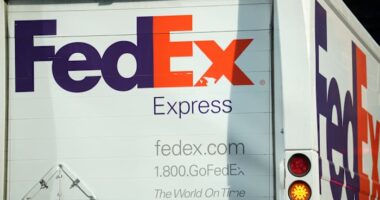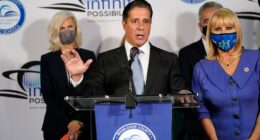Share this @internewscast.com

(The Hill) The worst impacts of President Donald Trump’s tariffs could hit just in time for back-to-school shopping.
Whether or not Trump reaches new deals with China and other trading partners, spikes in prices are already affecting clothing, electronics and other classroom essentials, and the deepest cuts could be mere weeks away.
Parents’ back-to-school habits are already changing, and businesses are stressing about the effects to their bottom line, with major family retailers including Walmart and Target sending up warning signs to consumers.
Stores preparing for back-to-school shopping early
Shoppers might try to step up their purchases to avoid an end-of-summer hammer fall, echoing earlier advance work from the stores themselves.
“A lot of retailers tried to get ahead of tariffs and brought product in earlier. They front-loaded to try to protect themselves and consumers,” said Jonathan Gold, vice president of supply chain and customs policy at the National Retail Federation, adding many retailers also canceled product orders during the period when tariffs for China were over 100%.
After Trump’s agreement with China for a 90-day pause in the largest tariffs, stores are looking to increase their orders again to get product in during the truce.
But even the nation’s biggest retailers say they can’t entirely plan around the trade war.
Walmart CEO says company cannot ‘absorb all the pressure’ from tariffs
Walmart CEO Doug McMillon said in an earnings call that the company is not “able to absorb all the pressure,” infuriating Trump.
“Walmart should STOP trying to blame Tariffs as the reason for raising prices throughout the chain,” the president wrote on Truth Social. “Walmart made BILLIONS OF DOLLARS last year, far more than expected.”
“Between Walmart and China they should, as is said, ‘EAT THE TARIFFS,’ and not charge valued customers ANYTHING,” he added. “I’ll be watching, and so will your customers!!!”
56% of consumers started back-to-school shopping in 2024: Study
Last year, more than $41 billion was spent on back-to-school shopping, with 56% of consumers starting in early July, according to Capital One Shopping Research.
“One of the things that already started to occur is kind of the lengthening of the season. People are already out there buying items. They’re already trying to anticipate what their August purchases might look like in an effort to get ahead of either price increases or product shortages,” said Steve Lamar, president and CEO of the American Apparel & Footwear Association.
“We’ve been trying to ship back to school for the last month or so. The products have to be on the shelves during the summertime when consumers are shopping, which means they have to arrive before the summer begins, or the early part of the summer, which means they had to be shipping already. So this tariff crisis, this tariff war, is hitting just as back-to-school shopping is occurring,” Lamar added.
The Hill has reached out to the White House and the Commerce Department for comment.
Tariffs will cause 1.7% rise in prices in short run: Yale University
According to Yale University’s Budget Lab, the 2025 tariffs will cause a 1.7% rise in prices in the short run.
The tariffs will also disproportionately affect clothing and textiles, according to The Budget Lab, with short-run apparel prices going up 14% and shoe prices rising 15%.
“One of the things that’s hard is back to school is a really emotional time for families. It’s a time of beginnings. It’s often very exciting, and it’s going to be hard for people when they feel like they can’t do what they want to be able to do for their kids heading into the school year,” said Martha Gimbel, executive director for the Budget Lab.
“The tariffs are hitting items that are really hard for people to plan around,” Gimbel added, noting how much a child will grow over the summer can be hard to predict, leaving parents to have to deal with August prices.
Christmas shopping could also be affected by tariffs
Back-to-school shopping could also be stifled by fears of what is to come as economists are already having discussions about how the Christmas season could also face pitfalls with the tariffs.
“Just a few weeks ago, we were talking about how the Christmas season might get impacted, because companies need to place orders now for what’s going to get produced for the Christmas season,” Gimbel said.
“I think in a time of uncertainty, people want to feel like they have control, and they want to feel like there’s something they can do to respond optimally to the situation. And, unfortunately, there’s not a really clear answer here,” she added.











